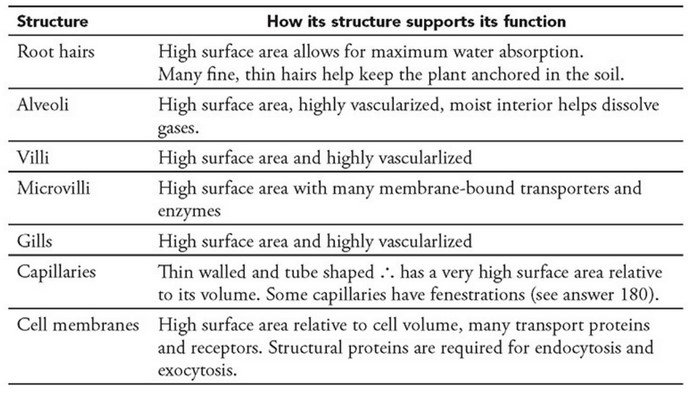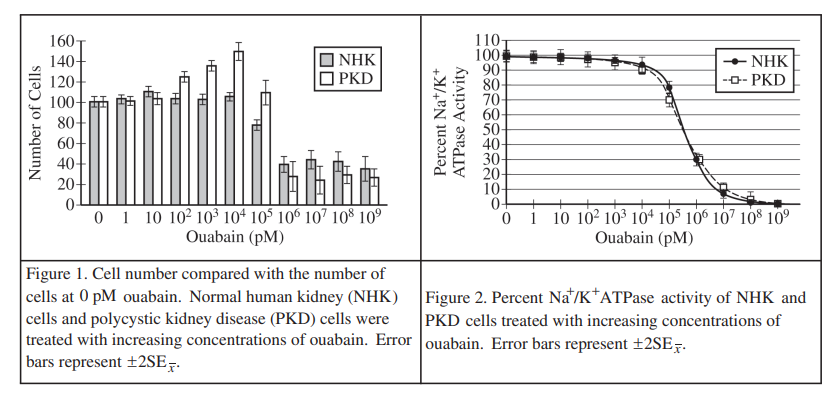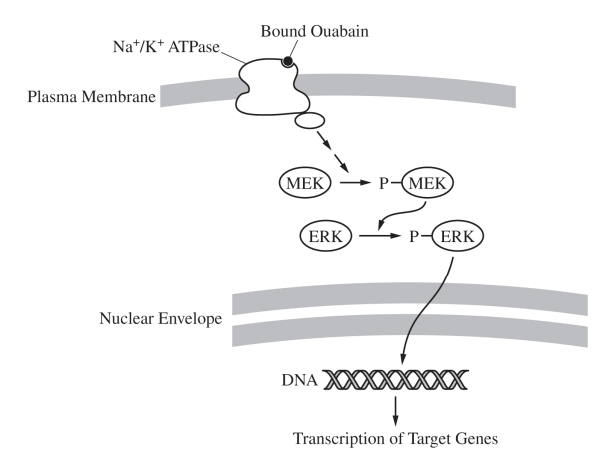Question
The properties of surfaces are critical in performing their exchange functions.
List three structural properties of exchange surfaces in organisms. Choose an example of a cellular or organismal structure associated with exchange and briefly describe the structural features that support its function.
▶️Answer/Explanation
Ans:
Properties of exchange surfaces include:
(1) Thin exchange surface
(2) Large surface area, almost always highly folded or convoluted
(3) Moist surface
(4) Structural proteins such as channels, carrier proteins, pumps, and
protein-lined pores
(5) In animals with a closed circulatory system
Examples of exchange structures:
Question:
Estrogens are small hydrophobic lipid hormones that promote cell division and the development of reproductive structures in mammals. Estrogens passively diffuse across the plasma membrane and bind to their receptor proteins in the cytoplasm of target cells.
(a) Describe ONE characteristic of the plasma membrane that allows estrogens to passively cross the membrane.
(b) In a laboratory experiment, a researcher generates antibodies that bind to purified estrogen receptors extracted from cells. The researcher uses the antibodies in an attempt to treat estrogen-dependent cancers but finds that the treatment is ineffective. Explain the ineffectiveness of the antibodies for treating estrogen-dependent cancers.
▶️Answer/Explanation
Ans:
(a) Plasma membranes are formed of phospholipid bilayers with a middle region made of hydrophobic tails. Because these are hydrophobic the estrogens can diffuse between the tails & into the cell. This allows small & uncharged (hydrophobic) molecules to diffuse into the cell passively.
(b) Antibodies are unable to cross the plasma membranes of he cells. The receptor proteins are located within the cytoplasm of the cell. Because of this using antibodies to block the receptors would be useless as the antibodies are too large to enter the cell & bind to the receptors.
Question:
Polycystic kidney disease (PKD) is an inherited disease that causes water loss from the body and affects cell division in the kidneys. Because water movement across cell membranes is related to ion movement, scientists investigated the role of the Na+ /K+ ATPase (also known as the sodium/potassium pump) in this disease. Ouabain, a steroid hormone, binds to the Na+ /K+ ATPase in plasma membranes. Individuals with PKD have a genetic mutation that results in an increased binding of ouabain to the Na+ /K+ ATPase. The scientists treated normal human kidney (NHK) cells and PKD cells with increasing concentrations of ouabain and measured the number of cells (Figure 1) and the activity of the Na+ /K+ ATPase (Figure 2) after a period of time. The scientists hypothesized that a signal transduction pathway that includes the protein kinases MEK and ERK (Figure 3) may play a role in PKD symptoms.


Figure 3. Signal transduction pathway hypothesized to play a role in the increased number of PKD cells
(a) Describe the characteristics of the plasma membrane that prevent simple diffusion of Na+ and K+ across the membrane. Explain why ATP is required for the activity of the Na+ /K+ ATPase.
(b) Identify a dependent variable in the experiment represented in Figure 1. Justify the use of normal human kidney (NHK) cells as a control in the experiments. Justify the use of a range of ouabain concentrations in the experiment represented in Figure 1.
(c) Based on the data shown in Figure 2, describe the relationship between the concentration of ouabain and the Na+ /K+ ATPase activity both in normal human kidney (NHK) cells AND in PKD cells. The scientists determined that Na+ /K+ ATPase activity in PKD cells treated with 1 pM ouabain is 150 units of ATP hydrolyzed/sec. Calculate the expected Na+ /K+ ATPase activity (units/sec) in PKD cells treated with 6 10 pM ouabain.
(d) In a third experiment, the scientists added an inhibitor of phosphorylated MEK (pMEK) to the PKD cells exposed to 4 10 pM ouabain. Based on Figure 3, predict the change in the relative ratio of ERK to pERK in ouabain-treated PKD cells with the inhibitor compared with ouabain-treated PKD cells without the inhibitor. Provide reasoning to justify your prediction. Using the data in Figure 1 AND the signal transduction pathway represented in Figure 3, explain how the concentration of cyclin proteins may increase in PKD cells treated with 4 10 pM ouabain.
▶️Answer/Explanation
Ans:
The Plasma membrane is composed of phospholipids, which have a hydrophilic phosphate head and incurred facing hydrophobic fatty and tails. This plasma membrane is sripomeable meaning that only ronpdar, small substances can undergo simple diffusion through this membrane. Since Na+ and K+ are ions, (they have an electric change) they must enter the cell through transport proteins since can’t diffuse through membrane. Because cells create a gradient of K+ ions within the e.i, ATP is required for he transport protein Na+ /K+ ATPose. Since the cell is bringing in more K+ ions against their concentration gradient and pumping out Na+ ions against their concentration gradient, energy in the form of ATP is necessary for this protein to work.
Dependent variable is the number of resulting NHK and PKD cells following different concentrations of obtain NHK cells serve as a model to compare the cellular changes caused by obtain in PKD cells, since the values collected would be insignifigent without a relevant comparison. Using a range of obtain concentrations allowed the researches to observe the changes that occur in cells in multiple conditions, since a very small amount of obtain may have a very different effect on Hinchey cells compared to a very high amount.
In both normal kidney cells and PKD cells, as concentration of obtain increases past 104 PM, a drastic decrease in Na+ /K+ ATPose occurs. So there is a negative relationship between obtain and Na+ /K+ ATPose activity. In PKD cells treated with 106 pM obtain, Na+ /K+ ATPose activity is 45 units of ATP hydrolyzed per second.
The relative ratio of ERk to pERK will increase in cells treated with the inhibiter compared to cells not treated with the inhibiter. Since PMEk signals the transfer of ERK to PERK, if this PMEk is inhibited, it wan’t allow for the phosphorylation of ERk to PERk and the amount of ERk will increase relative to PERk, causing an increase in ration.
Obtain is a signaling molecule that causes the transcription of target goes in Hinchey cells. Since PKD cells have increased binding of obtain, and cells in a concentration of 104 obtain have significantly higher levels of cells; it can be inferred that obtain increase transcription of cyclin goes, which promote cell growth+ duisun, as shown in figure 1.
